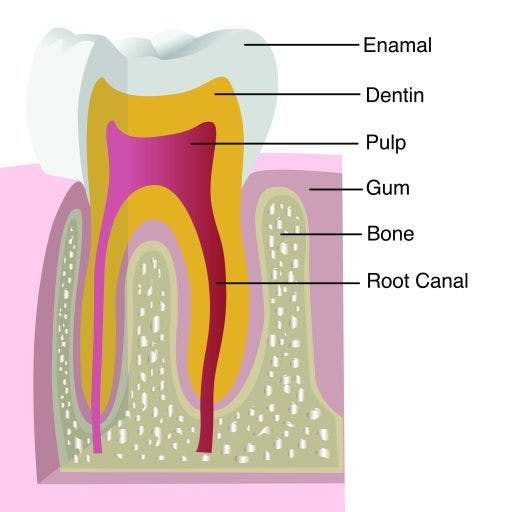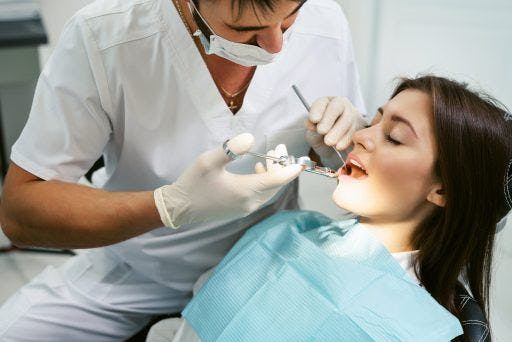Imagine the following scenarios – you’re drinking your morning coffee or enjoying your favourite ice cream when, suddenly, you feel a sharp pain in your mouth. Your sensitive teeth are acting up again, and it usually happens at the most inconvenient of times.
Sensitive teeth can be frustrating, but you’re not alone. This condition is fairly common. After all, the Asia-Pacific region accounted for 35.7% of the market for sensitive toothpaste.
What are sensitive teeth?
Sensitive teeth can make certain enjoyable habits such as eating, drinking, and even brushing your teeth quite uncomfortable because of the sharp, sudden pain. It occurs when the protective enamel layer surrounding the teeth has worn down or when the gum line is receding, exposing your dental roots. Other factors, such as a cavity, a cracked or chipped tooth, a worn filling, or gum disease, may also cause this discomfort.
Signs of sensitive teeth
If you have sensitive teeth, you’ll experience pain or discomfort due to certain triggers:
- Brushing your teeth
- Flossing your teeth
- Alcohol-based mouthwash
- Hot foods and beverages
- Cold foods and beverages
- Acidic foods and beverages
- Sweet foods and beverage
- Cold air
What causes sensitive teeth?

The quickest explanation for sensitive teeth is weakened enamel or exposed roots. Discomfort at seemingly ordinary activities is a telltale sign, especially when you’re consuming food or drinks at extreme temperatures or perhaps what you’re having is sweet or acidic.
But how does this sensitivity happen? Here are some things that could be wearing your teeth out.
You brush too hard.
While brushing is still the best way to protect your teeth from cavities, you might be overdoing it. Overbrushing or using a toothbrush with firm bristles is painful and causes the enamel to erode, potentially exposing the dentin, a sensitive layer of tissue underneath the enamel.
Your gums are receding.
Are your gums receding? Periodontal disease and smoking can cause this, but so can aggressively brushing over time. Gum recession can expose the tooth roots, which contain tiny nerve endings sensitive to specific food and drinks.
You grind your teeth.
Do you grind or clench your teeth without realising it? Perhaps you even do it while you’re asleep or stressed. Bruxism can wear down the enamel, leading to sensitive teeth.
You may have cavities or tooth decay.
Cavities can cause tooth sensitivity if they reach the pulp of the tooth, which contains nerves and blood vessels.
You love acidic foods and beverages.
Oranges are terrific for your health but it’s wise not to overdo it. According to the Australian Dental Association, acidic items, such as soda, wine, or citrus fruit can wreak havoc on your teeth – especially if you don’t brush after.
You just went through a dental procedure.
If you feel your teeth have become more sensitive after a dental procedure such as teeth whitening, filling, or veneer installation, don’t worry. It’s normal for these procedures to cause temporary sensitivity. Don’t forget to ask your dentist about any potential side effects after treatment so you can prepare accordingly.
You’re getting older.
As you age, your enamel naturally gets thinner, exposing the dentin. The dentin is your tooth’s secondary support system after the enamel. While still made of tough material, it’s softer than the surface and contains tiny tubes that are sensitive to temperature and pressure.
5 common misconceptions about tooth sensitivity
Some believe sensitivity always points to cavities, while others swear you can permanently treat it with home remedies. Spoiler alert – both assertions are untrue. Shocking! Curious to know what else isn’t true? Here’s the truth behind some common misconceptions about tooth sensitivity.
Misconception #1: Brushing leads to sensitivity.
No, brushing your teeth doesn’t directly cause sensitivity, but brushing too often and vigorously does. Experts call it “overbrushing” – a bad habit that can put you at risk for toothbrush abrasion, sensitive teeth, and gum recession. When you brush too hard, you can wear away the dental enamel protecting the sensitive inner tooth over time.
Once that exterior thins out or becomes damaged, it can expose the dentin layer underneath. “When a stimulus directly contacts the dentine, it may cause pain from the nerve,” explains the Australian Dental Association. Improper brushing, especially near the gumline, can also lead to bleeding, irritated gums, and other gum issues.
Misconception #2: It’s always a sign of tooth decay.
Tooth decay (also known as dental caries or cavities) results from bacterial buildup that gradually weakens the enamel and exposes the dentin. As a result, you might experience sensitive toothaches. However, not every case is solely attributable to tooth decay. If you’re experiencing sensitivity across multiple teeth with no visible signs of cavities, you may be dealing with dental erosion, gum disease, or other problems.
Misconception #3: Cold foods are the only triggers.
Most people complain of tooth sensitivity pain when consuming something cold, like ice cream or smoothies. This sensation happens because the dentin connects to nerve endings in the tooth pulp. When external stimuli (such as temperature changes) reach this layer, it leads to a sharp, sudden pain in your mouth. But cold treats aren’t the only things that can prompt this reaction.
Hot, sweet, and acidic foods or beverages can also trigger sensitivity. If you have an underlying oral health condition, even chewing can be an uncomfortable experience, as it stimulates the nerves.
Misconception #4: Clear aligners cause teeth sensitivity.
As established, overbrushing leads to dental erosion by “wearing down” the tooth’s surface. It can also cause gums to recede, exposing the dentin and tooth root. Constant exposure to acidic substances, like food, drink, or stomach acid, is another primary cause. These factors and habits weaken the enamel over time. And the more compromised your enamel is, the more sensitive your teeth become.
Clear aligners can’t cause sensitivity since these orthodontic appliances can neither erode enamel nor recede gums. In other words, they can’t “make” your teeth more sensitive the way overbrushing or acids might. And according to the Australian Society of Orthodontists, there’s “research to suggest that people who opt for [this treatment] are actually less likely to suffer from sensitive teeth.”
Specifically, one 2021 study published in the European Journal of Orthodontics found that “patients treated with clear aligners experienced lower pain levels, less anxiety, and higher [oral health-related quality of life] [vs] those receiving fixed appliances.”
So, yes, you can safely and comfortably undergo aligner therapy with ClearCorrect. You may experience discomfort during the adjustment period, but it should taper off within a few days. This is normal at the start of treatment as your teeth move into their proper positions. But if you notice persistent pain or sensitivity, it may signal a deeper problem. It’s best to talk to your dentist.
Misconception #5: Toothpaste and pain relievers are enough to treat it.
Now, you might be thinking, “How do I fix tooth sensitivity?” Desensitising toothpaste can help treat sensitive teeth with certain ingredients, including potassium nitrate, arginine and calcium carbonate, and strontium chloride. These specialised formulas work by either soothing tooth nerves, creating a protective barrier over delicate dentin, or both.
Over-the-counter pain medicine can also provide temporary relief. However, these measures aren’t enough to soothe all cases of sensitivity, especially if there’s an underlying cause you’re not addressing.
If tooth decay is the issue, you might need fillings, crowns, root canals, or other in-chair treatments to tackle it properly. Maybe your problem is teeth grinding – in which case, it could be wise to get a night guard for protection. If your enamel is extremely eroded, your dentist may need to apply fluoride gel or varnish on your teeth.
Ultimately, the only way to know if you have the right treatment plan for your case is to see a dental professional for an assessment. Don’t rely on your own “diagnosis” or self-medication to treat long-term sensitivity, as you risk doing more harm than good. With the right solution recommended by your dentist, you could be biting into that ice cream in no time!
Treatments for sensitive teeth

Can sensitive teeth go away on their own? No, not without special care. It’s important to keep in mind that your dental enamel, the hardest material in your body, does not regenerate. It means you have to take care of what you have as much as possible. Here’s what you can do.
1. Start with a soft-bristled toothbrush.
They feel gentle on your gums and the dental surface, preventing further damage or decay.
2. Be consistent with your oral hygiene practices.
Brushing and flossing consistently can help remove plaque and prevent cavities, which are possible causes of gum recession. You can also try a desensitising toothpaste to help block nerve endings and reduce pain. Or opt for fluoride toothpaste to help strengthen or re-fortify your enamel. Again, ask your dentist for your best options.
3. Make changes to your diet.
A balanced, calcium-rich, and vitamin D-heavy diet can help strengthen your teeth. The same goes for limiting your consumption of acidic foods and beverages. Or at least use a straw to minimise contact with your teeth.
4. Get professional advice and treatment.
If worse comes to worst, your orthodontist may suggest veneers or laminates to “replace” your eroded enamel.
It’s necessary to get checked by an actual dental practitioner to help you understand your oral condition. They may be able to recommend ways to up your dental care strategy, from using an electric toothbrush to aligners, like ClearCorrect, to fix any crookedness or misalignment that might compromise your oral hygiene.
This orthodontic treatment offers a discreet, comfortable, and highly effective solution to move teeth into their proper positions. ClearCorrect aligners are made with a revolutionary tri-layer ClearQuartz material, which exert gentle force to move teeth into their proper positions. Additionally, their high trimline makes them look natural. Take this online smile assessment to find out if you’re a candidate.
Being a sensitive person is okay, but having sensitive teeth can be a literal pain in the neck. Go on, enjoy that ice cream with these tips.
References:
Sensitive Toothpaste Market share , Size | Industry Growth 2031. (n.d.). Allied Market Research.
West, N. X., Lussi, A., Seong, J. K., & Hellwig, E. (2013). Dentin hypersensitivity: pain mechanisms and aetiology of exposed cervical dentin. Clinical Oral Investigations, 17(S1), 9–19.
Zahara, A. M. (2012b, June 1). Relationship between Food Habits and Tooth Erosion Occurrence in Malaysian University Students. PubMed Central (PMC).



